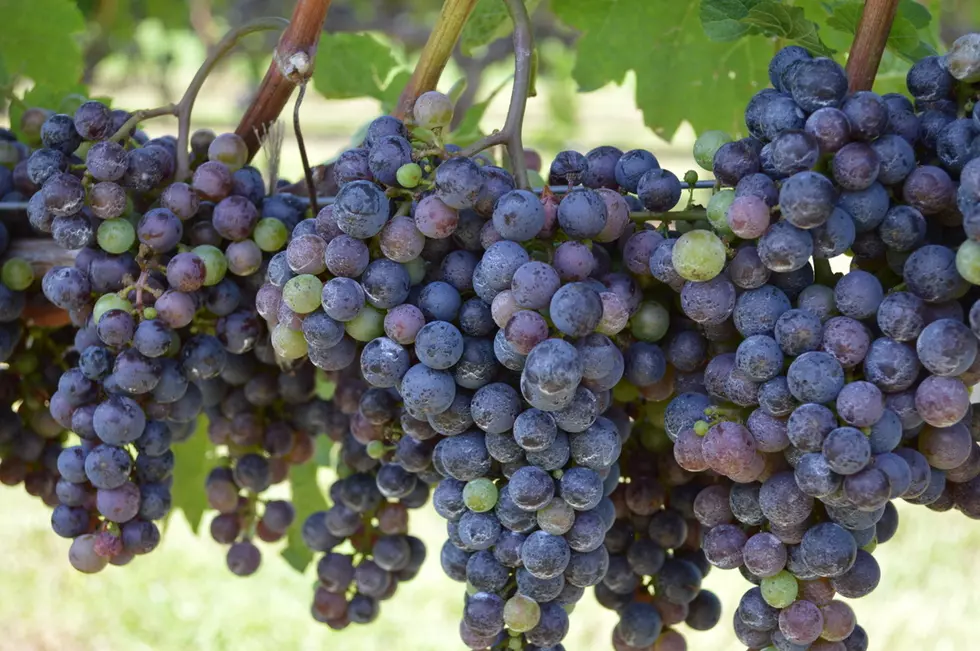
Red or white: Grape harvesting and winemaking season are underway in NJ
"A bottle of white, a bottle of red
Perhaps a bottle of rose instead"
It’s Sept. 1 and that’s the beginning of grape harvesting season here in New Jersey.
The first grape typically to be harvested is usually Pinot Grigio, says Scott Donnini, Chairman of The Garden State Wine Growers Association and owner of Auburn Road Vineyards in Pilesgrove.
What is grape harvesting season?
Harvest season lasts for about two and a half months in New Jersey because all the grapes become ripe at different times, fortunately, otherwise, vineyards would drown in wine juice, he said.
Donnini harvests about nine different varieties of grapes on his 23-acre vineyard. He and his team make a variety of delicious wines including, Pinot Grigio, Chardonnay--an oaked and an un-oaked version, Merlot, Chambourcin, Cabernet Sauvignon, and Cabernet Franc. They also make a dry rose wine out of Sangiovese, which is the Chianti grape.
Grape harvesting lasts from the moment grapes are from the vines until the wine is done fermenting and is tucked away where it’s going to wind up whether it’s a tank or barrel.
Donnini says on his vineyard, grapes are picked entirely by hand, cluster by cluster, and taken gently into the winery.
Once the grapes are cut off the vines, they are brought into the winery to be processed, and then they are weighed. The white wine grapes go into the wine press the same day so they can be made into juice and the juice is fermented.
Red grapes are immediately crushed after being picked. Donnini said to think about the “I Love Lucy” episode where its lead character played by Lucille Ball is in Italy and she is comedically stomping grapes with the locals. Of course, he says grape crushing today is done by machine and not by feet since that is not very sanitary when making wine. The juice and skins of the red grape are fermented together and all of this happens on the same day as harvesting.
What is the winemaking process?
Donnini describes the winemaking process as “part science, part art, and part mystery.”
“We didn’t even know what made wine into wine before Louis Pasteur. He discovered microorganisms,” Donnini said.
Before that wine that was made in the 1800s or in ancient Roman times, was sort of a miracle. They crushed the grapes and somehow wine was made.
It is only very recently that people have gotten into the science of how wine is made and the technical aspects of it, Donnini said.
The winemaking process is different for both white and red wines.
With white wine, such as Chardonnay, he said you want to separate the grapes from their skins as quickly as possible, and then ferment the juice. Harvested grapes for white wine immediately go into the presser.
“The press squeezes the grapes. The juice comes out and then the juice goes into a stainless steel tank in most cases. You chill it and ferment it cold, so you want to ferment it very slowly,” Donnini said.
When the temperature is dropped to 55 degrees, the yeast is added because fermentation is yeast-eating sugar which gives off alcohol and carbon dioxide. The yeast eats the sugar, but because it is very cold, the yeast eats very slowly. Donnini said it takes about a month or so for the yeast to ferment the sugar away. This is called “fermentation dryness.” All the sugar is then converted to alcohol and it is officially white wine at this point.
With red wine, such as Merlot, the grapes are crushed or stomped and then the fruit goes into a fermentation vat where the skin and grapes basically hang out together, he said.
“You want that to be fairly warm because you want the wine and the juice to cook the skins and pull the color out of it because that is where the color comes from. The juice inside of all grapes is clear so all the things that make a red wine red, come from the skins and seeds,” said Donnini.
Since it’s warm and it gets fairly hot inside the fermentation vat, the fermentation process happens very quickly. Unlike white wine, which takes about a month to ferment, the red wine fermentation process only takes a week. At that point, it is officially wine.
Everything that happens after a week is called the aging process or letting the wine settle, he said.
How can New Jerseyans make their own wine?
Donnini said there are wine schools in the state where people can go in with a bunch of friends to make their own wine barrels.
Making wine at home is simple. Just buy a kit. The juices are all ready for you. Choose red or white. It’s all balanced and the kit comes with the tools to help you get started and get your feet wet in the winemaking process, he said.
Donnini said if you want to get more technical, buy grapes and go through the real process of crushing, pressing, and fermenting. One place that can help with this particular process is Gino Pinto in Hammonton. Donnini said they have become the winemaker’s choice for years because they distribute, import, and export not only winemaking equipment but the grapes themselves, juices, bottles, and accessories.
While some wineries in New Jersey will host grape stomping events, Donnini said this is more for show and not for winemaking because of sanitary reasons.
Harvesting grapes is extremely hard work so it’s not really offered as an activity for wine customers to take part in at the vineyards. However, if you are interested in the process, he said many vineyards will allow you to come and watch harvesting taking place, all while enjoying a lovely glass of homemade, authentic New Jersey wine.
“It is a celebration and that is what harvesting is all about. You’ve been through a long and tough season worried about the weather, birds eating your grapes, and diseases. So, harvest is finally a place where the grapes come in. They’re beautiful and they’re going to make awesome wines,” Donnini said.
So, raise a glass of New Jersey wine and say cheers to a successful harvesting and winemaking season!
Jen Ursillo is a reporter and anchor for New Jersey 101.5. You can reach her at jennifer.ursillo@townsquaremedia.com
Click here to contact an editor about feedback or a correction for this story.




